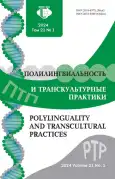Implicit Bilingualism in the Prose of Fazil Iskander
- 作者: Bitokova M.V.1, Kankulova A.S.1
-
隶属关系:
- Kabardino-Balkarian State University named after Kh.M. Berbekov
- 期: 卷 21, 编号 1 (2024)
- 页面: 134-143
- 栏目: LITERARY SPACE
- URL: https://journal-vniispk.ru/2618-897X/article/view/326951
- DOI: https://doi.org/10.22363/2618-897X-2024-21-1-134-143
- EDN: https://elibrary.ru/CCUJJV
- ID: 326951
如何引用文章
全文:
详细
The study examines the peculiarities of the manifestation of Fazil Iskander’s bilingualism in the works “Sandro of Chegem”, “Childhood of Chik” and “Sofichka”. They were chosen as the main research material because they represent the most complete “Abkhazian” metatext of the writer: the action takes place in Abkhazia, the subject of the image is often not only folk types of character, but also the traditional way of life, folk customs and rituals. Such immersion in the cultural context cannot do without language switching, which provides the effect of authenticity. The relevance of such research is dictated not only by the relentless interest of modern humanities in the phenomenon of poly- and bilingualism, but also by the need to attribute the work of the Russian writer of Iranian-Abkhaz origin: simultaneously with the popularity of his works and the reader’s interest in them, there is a shortage of scientific understanding of Iskander’s creative heritage. The purpose of our research is the peculiarities of the mechanisms of bilingualism in the work of Fazil Iskander. His bilingualism, due to the fact of his birth in the national republic and upbringing in a Russian-speaking environment, was reflected in the linguistic features of the works he created. These features include calcified speech formulas and etiquette phrases, the specifics of nominology (in particular, the nicknames that the writer uses), the traditions of Abkhazian oral eloquence. All these ways help Iskander to fill the novel and the cycles of stories with a poetic attitude to the depicted idyll of folk life, on the other hand, solves a lot of pragmatic writing tasks. The result of this article can be considered the definition of the peculiarities of Fazil Iskander’s bilingualism, which manifests itself at various levels - phonetic, word-formation, syntactic, as well as in orientation to the traditions of the Abkhaz oral narrative, the features of traditional eloquence.
作者简介
Marina. Bitokova
Kabardino-Balkarian State University named after Kh.M. Berbekov
编辑信件的主要联系方式.
Email: mariebitok@gmail.com
ORCID iD: 0000-0001-6928-3115
SPIN 代码: 3030-9132
Candidate of Phililogy, Associate Professor of the Department of Russian and Foreign Literature
173 Chrenyshevskyi St, Nalchik, 360004, Kabardino-Balkarian Republic, Russian FederationArina Kankulova
Kabardino-Balkarian State University named after Kh.M. Berbekov
Email: shans11@list.ru
ORCID iD: 0000-0002-2994-4166
SPIN 代码: 7161-1397
Postgraduate Student of the Department of Russian and Foreign Literature
173 Chrenyshevskyi St, Nalchik, 360004, Kabardino-Balkarian Republic, Russian Federation参考
- Ivanova N. 2019. The world and the myth of Fazil Iskander. Bulletin of the Literary Institute named after A.M. Gorky, no. 4, pp. 8–13. (In Russ.).
- Bakhtikireeva U.M., Valikova O.A., and N.A. Tokareva 2021. At the “Agora” today: approaches to the study of translingual literature. Philological sciences, vol. 6, no. 2, pp. 263–273. (In Russ.). http://doi.org/10.20339/PhS.6-21.263
- Khukhuni G., Valuitseva I. 2021. Bilingual creativity: language switching or language shift? // Philological sciences, vol. 6, no. 2, pp. 227–234. (In Russ.). http://doi.org/10.20339/PhS.6-21.227
- Bakhtikireeva U.M., and B.E. Shagimgereyeva. 2020. Language Biography of a Creative Personality: Bakhyt Kairbekov. Social and humanitarian sciences in the Far East XVII, no. 1, pp. 83–90. (In Russ.).
- Yakhina G.Sh. 2016. Zuleikha Opens Her Eyes. Moscow: AST Publ.: Elena Shubina. Print. (In Russ.).
- Abgaran N. 2017. People who are always with me. Moscow: AST Publ. Print. (In Russ.).
- Ibragimov K.H. 2021. Marshal. Moscow: Veche. Print. (In Russ.).
- Iskander F. 2007. Chick’s childhood. Moscow: Time Publ. Print. (In Russ.).
- Bakhtikireeva U.M., and O.A., Valikova. 2017. Translingualism and revitalization of culture. RUDN Journal of Language Studies, Semiotics and Semantics, vol. 8, no. 1, pp. 57–63. (In Russ.). https://doi.org/10.22363/2313-2299-2017-8-1-57-63.
- Iskander F. 2009. Sandro of Chegem. Moscow: Exmo Publ. Print. (In Russ.).
- Chachhalia D. K. 2019. About the prose of Fazil Iskander in the context of the traditions of the oral Abkhazian story. Bulletin of the Literary Institute named after A.M. Gorky, no. 4, pp. 68–70. (In Russ.).
- Iskander F. 2010. Sofichka. In Iskander F. About Love. Moscow: Exmo Publ., pp. 155–349. Print. (In Russ.).
补充文件









